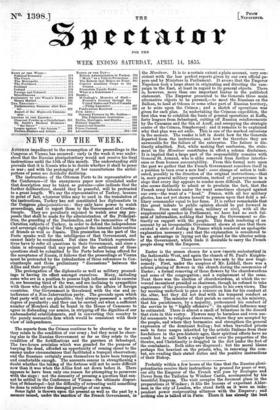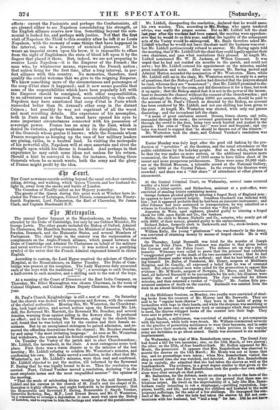Probably within a few hours of the time that the
Russian pleni- potentiaries receive their instructions to proceed for peace or war, our ally the Emperor of the French will pass by Boulogne and Dover from the Tuileries to Windsor Castle, accompanied by his beautiful Empress. The visit occupies the foremost place in the preparations at Windsor; it fills the bosoms of expectant Alder- men in the city of London, who stand forth as it were an inde- pendent power reciprocating alliances with the Emperor ; and nothing else is talked of in Paris. There it has already the best
effects : except the Fusionists and perhaps the Confusionists, all are pleased either to see Napoleon consolidating his strength, or the English alliance receive new ties. Something beyond the cere- monial is looked for, and perhaps with justice. Not that the first visit of Napoleon the Third to this country after he left it as Louis Napoleon, with the memory of some things that have happened in the interval, can be a journey of unmixed pleasure. If he wears an imperial crown upon his brow, it is impossible to efface from the sight of Englishmen the stain of blood left upon it by the fingers that placed it there. But, indeed, we are not preparing to receive Louis Napoleon—it is the Emperor of the French ; the man who, by whatsoever means, represents the French nation ; that nation being for the first time, after a long interval, in per- fect alliance with this country. No memories, therefore, need qualify the cordial welcome that we give to the reigning Emperor. We know something more of the circumstances and personages of the coup d'etat since it happened ; and it now seems possible that some of the responsibilities which have been popularly left with the Emperor should be consigned, with other responsibilities, to an adventurer now removed from accountability on this earth. Napoleon may have sanctioned that coup d'etat in Paris which succeeded better than St. Arnaud's other coup in the distant Crimea ; but possibly he was not cognizant of all the worst and most revolting details. His experience of his accomplice, both in Paris and in the East, must have opened his eyes to some important circumstances connected with his possession of sovereign power. France has an army in the East, which is denied its victories, perhaps weakened in its discipline, for want of the Generals whose genius it knows ; while the Generals whom France recognizes as keeping up the race of her military leaders are pining, exiles, in a neutral land. In visiting the metropolis of his powerful ally, Napoleon will at once ascertain and rivet the strength upon which his throne is founded. And perhaps in that experience he may catch some ideas not useless for his return. Should a hint be conveyed to him, for instance, touching those Generals whom he so much wants, both the army and the glory of France might profit by the idea.



























